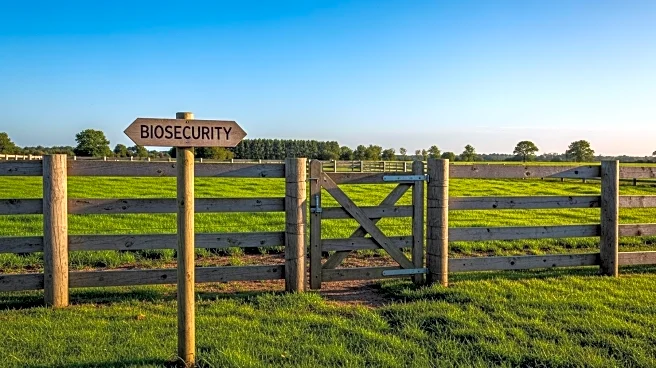What's Happening?
Farmers and livestock breeders from Larissa, central Greece, met with the Ministry of Rural Development to address the ongoing sheep pox outbreak affecting the region. The meeting aimed to discuss the government's measures to contain the outbreak, which has led to the culling of over 35,000 sheep and goats since August. Despite the urgency, farmers expressed disappointment over the lack of a clear payment schedule and additional support measures. The government has implemented strict controls to prevent a lockdown, focusing on cracking down on concealed cases and illegal activities related to animal slaughter and transport. Initial subsidy payments have begun, with more expected in the coming weeks to support affected farmers.
Why It's Important?
The sheep pox outbreak poses significant challenges to the agricultural sector, impacting farmers' livelihoods and the local economy. The government's response, including subsidies and intensified controls, is crucial to prevent further spread and economic disruption. The situation highlights the need for effective disease management and support systems for farmers facing such crises. The outbreak's management will influence public policy and agricultural practices, potentially affecting food supply chains and market stability. Farmers' dissatisfaction with the government's response could lead to mobilizations, emphasizing the importance of timely and adequate support.
What's Next?
Farmers plan to reconvene in Larissa to organize nationwide discussions and potential mobilizations. The government is expected to continue processing subsidies and compensation more quickly to address farmers' concerns. The effectiveness of the current measures will be closely monitored, with potential adjustments based on the outbreak's progression. Stakeholders, including regional authorities and police, will play a role in enforcing controls and penalties under European regulations. The situation may prompt further dialogue between farmers and the government to ensure comprehensive support and prevent future outbreaks.
Beyond the Headlines
The outbreak raises ethical and legal questions regarding animal welfare and disease management practices. The government's approach to handling concealed cases and illegal activities reflects broader challenges in enforcing agricultural regulations. Long-term implications may include shifts in farming practices and increased focus on biosecurity measures. The crisis underscores the importance of collaboration between government agencies and the agricultural community to address public health threats effectively.









